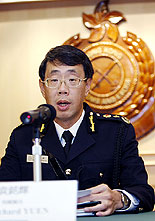
|
| Under control: Commissioner of Customs & Excise Richard Yuen says smuggling and drug trafficking are under control in Hong Kong. |
The Customs & Excise Department detected 695 drug-trafficking cases in 2007, up 9% over a year earlier. There were 627 arrests, five drug storage and distribution centre closures, and three indoor cannabis plantations shut down.
At a year-end briefing today Customs Commissioner Richard Yuen said the amount of cannabis, cocaine and ice - or methylamphetamine - seized was higher than in 2006, but the amount of ketamine, ecstasy and heroin was on the decline.
He recalled the biggest-ever transnational cocaine trafficking case in which Customs was involved, last July, in which 160kg of cocaine with an estimated value of $110 million was uncovered inside secret compartments in some incoming containers from Panama.
As there has been an upward trend of youth engaging in drug abuse despite a drop in the overall number of drug addicts, Mr Yuen pledged his department would contribute to the work of the Task Force on Youth Drug Abuse and step up measures against cross-boundary drug trafficking and drug abuse.
Stepped-up checks
"We have increased random inspections of cross-boundary vehicles, especially cross-boundary coaches, and will carry out more joint operations with Shenzhen Customs to provide a stronger deterrence against youths engaging in cross-boundary drug abuse," he said.
On smuggling, the department detected 172 cases last year, down 15.7% on 2006. Of these, 82 involved smuggling across a land boundary while 90 were carried out at sea. Goods seized valued a total of $435 million, and 352 people were arrested.
The most common goods smuggled out of Hong Kong, mainly into the Mainland, were high-end and high-value consumer products such as computer accessories and electronic products and appliances. Usual items smuggled into Hong Kong were cigarettes, counterfeit and infringing articles.
To prevent food smuggling, Mr Yuen said relevant departments - including the Food & Environmental Hygiene Department and Agriculture, Fisheries & Conservation Department - will work closely to ensure food safety.
Surveillance stepped up
A task force has recently been set up to co-ordinate inter-departmental efforts and communication with industries to enhance the effectiveness of enforcement action against food-smuggling activities, he added.
Turning to the protection of intellectual property rights, the Commissioner said there is a rising trend of people using the Internet to market and sell infringing articles. The number of cases climbed 50%, to 27 from 18 in 2006. More than 4 million pirated optical discs were also seized last year.
His department has tightened surveillance and enforcement action and will work closely with auction website operators to identify effective measures to curb such activities. Raids against shops and hawker stalls selling counterfeit goods during festivals will also be stepped up.
Consumer protection
After unscrupulous jewellery and electronic product shops deceived a spate of Mainland tourists last year, Mr Yuen looked forward to this year's upcoming passing of the Trade Descriptions (Amendment) Bill, to enable Customs to more easily prosecute offenders.
He noted a court fined a jewellery shop involved in such improper sales practices $100,000 last year and sentenced its director to six months in jail.
Illicit cigarette cases were down 41% and those of illicit fuel down 3% over the previous year. The number of public complaints about such cases also dropped, 34% and 15%.
On the overall situation in Hong Kong, Mr Yuen said it remained under control and showed no sign of deterioration from last year. His department will continue to clamp down on illegal activities and step up enforcement.
|